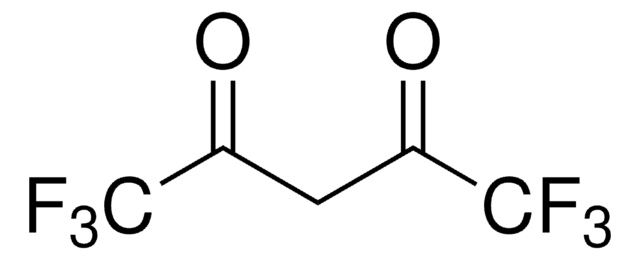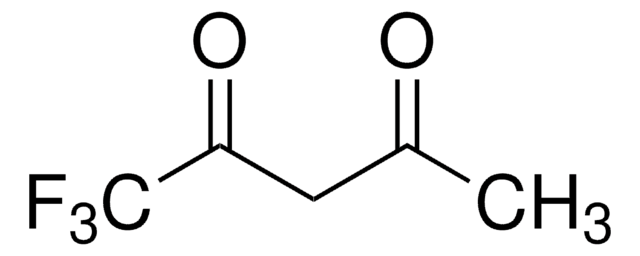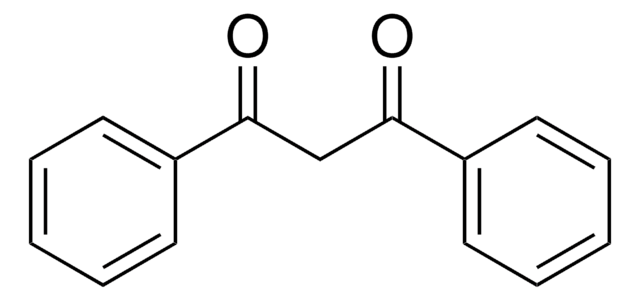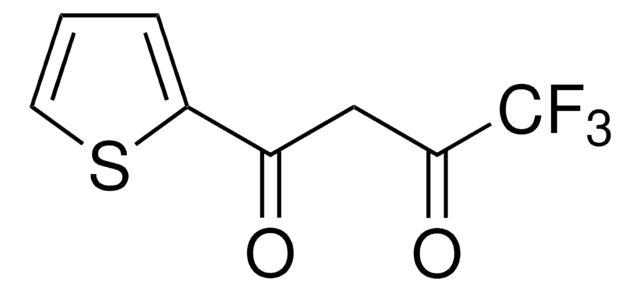155756
2,2,6,6-Tetramethyl-3,5-heptanedione
98%
Synonym(s):
Dipivaloylmethane
Sign Into View Organizational & Contract Pricing
All Photos(1)
About This Item
Linear Formula:
(CH3)3CCOCH2COC(CH3)3
CAS Number:
Molecular Weight:
184.28
Beilstein:
1447269
EC Number:
MDL number:
UNSPSC Code:
12352100
PubChem Substance ID:
NACRES:
NA.22
Recommended Products
Quality Level
Assay
98%
form
liquid
refractive index
n20/D 1.459 (lit.)
bp
72-73 °C/6 mmHg (lit.)
density
0.883 g/mL at 25 °C (lit.)
functional group
ketone
SMILES string
CC(C)(C)C(=O)CC(=O)C(C)(C)C
InChI
1S/C11H20O2/c1-10(2,3)8(12)7-9(13)11(4,5)6/h7H2,1-6H3
InChI key
YRAJNWYBUCUFBD-UHFFFAOYSA-N
Looking for similar products? Visit Product Comparison Guide
General description
2,2,6,6-Tetramethyl-3,5-heptanedione is a bidentate ligand used in the synthesis of stable complexes with lanthanide ions.
2,2,6,6-Tetramethyl-3,5-heptanedioneis a stable, anhydrous reagent. It undergoes O-additions and C-additions. In various reactions, it acts as an air-stable ligand for metal catalysts. Furthermore, it serves as a substrate for heterocycles.
2,2,6,6-Tetramethyl-3,5-heptanedioneis a stable, anhydrous reagent. It undergoes O-additions and C-additions. In various reactions, it acts as an air-stable ligand for metal catalysts. Furthermore, it serves as a substrate for heterocycles.
Application
2,2,6,6-tetramethyl-3,5-heptanedione was used in the synthesis of α-aryl-β-diketones and dicyanamidobenzene-bridge diruthenium complex.
2,2,6,6-Tetramethyl-3,5-heptanedione used as a ancillary ligand in the synthesis of orange-emitting iridium(III) complex.
2,2,6,6-Tetramethyl-3,5-heptanedione used as a ancillary ligand in the synthesis of orange-emitting iridium(III) complex.
Storage Class Code
10 - Combustible liquids
WGK
WGK 1
Flash Point(F)
152.6 °F - closed cup
Flash Point(C)
67 °C - closed cup
Personal Protective Equipment
dust mask type N95 (US), Eyeshields, Gloves
Choose from one of the most recent versions:
Already Own This Product?
Find documentation for the products that you have recently purchased in the Document Library.
Synthesis and characterization of phenylpyridine derivative containing an imide functional group on an iridium (III) complex for solution-processable orange-phosphorescent organic light-emitting diodes
Hwang J, et al.
Dyes and Pigments, 121, 73-78 (2015)
Muriel Fabre et al.
Inorganic chemistry, 45(23), 9332-9345 (2006-11-07)
The dicyanamidobenzene-bridge diruthenium complex [{Ru(tpy)(thd)}(2)(mu-dicyd)][PF(6)] ([3][PF(6)]) (dicyd = 1,4-dicyanamidobenzene, tpy = 2,2':6',2' '-terpyridine, thd = 2,2,6,6-tetramethyl-3,5-heptanedione) and its mononuclear counterpart [Ru(tpy)(thd)(Ipcyd)] (2) [Ipcyd = 4-iodophenylcyanamide anion (Ipcyd(-))] were synthesized and fully characterized. Cyclic voltammetry of 3 showed the presence of
2, 2, 6, 6-Tetramethyl-3, 5-heptanedione
Jurica EA
Encyclopedia of Reagents for Organic Synthesis, Second Edition (2001)
Elizabeth Buck et al.
Organic letters, 4(9), 1623-1626 (2002-04-27)
[reaction: see text]. In the copper salt catalyzed ether formation from aryl bromides or iodides and phenols, 2,2,6,6-tetramethylheptane-3,5-dione (TMHD) was found to greatly accelerate the ordinarily difficult reaction, making it occur under more moderate temperatures and reaction times. A series
Franklin P Ow et al.
The journal of physical chemistry. A, 110(25), 7751-7754 (2006-06-23)
Laser photoionization and ligand photodissociation in Ln(thd)(3) (Ln = Eu, Tb, Gd; thd = 2,2,6,6-tetramethyl-3,5-heptanedionato) are studied in a molecular beam via time-of-flight mass spectrometry. The fragmentation patterns are strongly wavelength dependent. With 355 nm excitation, the mass spectrum is
Articles
Buchwald phosphine ligands for C-C, C-N, and C-O bond formation.
Our team of scientists has experience in all areas of research including Life Science, Material Science, Chemical Synthesis, Chromatography, Analytical and many others.
Contact Technical Service








